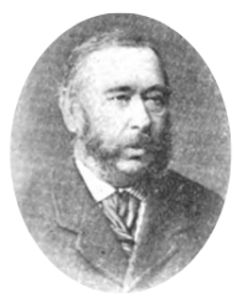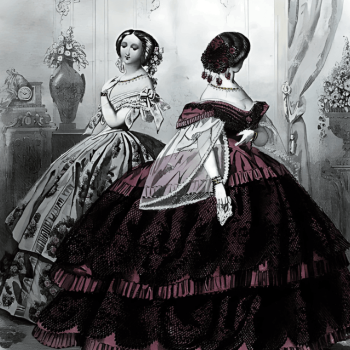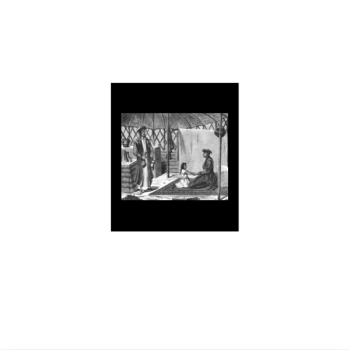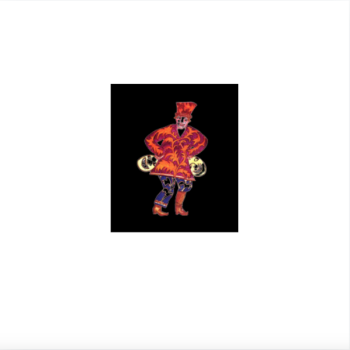THE WARLIKE PARTRIDGE
Summer 1840.
Baba Lena had large collections of all kinds of insects. Her office housed wonderful collections full of various animals and birds, antiquities, coins, fossils, and all kinds of rarities. Many learned people were in correspondence with her, and deliberately came from afar to meet her and see her office.[1] She would pin butterflies and beetles in rows in glass boxes with inscriptions above each of them. To add specimens to Baba Lena’s impressive entomological collection (as well as for the children’s own instruction and pleasure,) she organized expeditions, during the day and at night. The children preferred the nighttime adventures because it had a mysterious charm.
The children of friends and acquaintances in town, along with two or three dozen young serfs, ventured with the children into the neighboring forest armed with gauze nets and lanterns. In the rear a dozen strong grownup servants, Cossacks, and a gendarme or two, trailed behind them, armed with real weapons for their safety and protection in these diurnal expeditions that lasted well into the witching-hours. With their hunting-hearts beating, they set out to capture large night-butterflies for which the forests of the Volga province were so famous. They were known as “sphinxes,” but the children called them “dead heads” because they bore the distinct image of a white human skull on their dark “fur” covered bodies. The moths, which flew en masse, covered the glasses of their lanterns, and end their ephemeral lives pinned to cork burial-grounds.
Lelya, ever the eccentric, asserted her independence. Perhaps she felt guilty over the death of the gosling. Perhaps she remembered the butterfly that appeared at Sasha’s crib on the day of his death. Or perhaps she thought of her family, and the wars they fought in. Whatever the case may be, Lelya was not pleased with the slaughter of the “night butterflies.”
“Nature having imprinted on each of them the portrait of the skull of some great dead hero,” said Lelya, “these butterflies are sacred, and must not be killed.”
The girls laughed, thinking that she was joking, but Lelya got very angry when they continued chasing the “dead heads.”
“You are disturbing the rest of the defunct persons whose skulls are imprinted on the bodies of these weird insects!” she declared.[2]
This expedition, nevertheless, continued, and more were held throughout the summer.
One morning Lelya, Vera, and Aunt Nadya got ready to go into the grove for butterflies, with nets and boxes. They were accompanied by Natalya (the eldest of Baba Lena’s maids,) Matryona (Aunt Nadya’s maid,) and two younger maids. The day was wonderful. The sun burned brightly in the cloudless sky, the birds were singing, and the wind in the flowering linden alley purred with buzzing bees. When they went out onto the lawn, beyond the ravine, their eyes traced bright flowers in the unmown grass, white, yellow, and pink rose hips. There were many moths, too, and other insects that buzzed and fluttered between the bushes, buzzing and shimmering in the hot rays of light.
They eagerly set to work (though, in truth, they scattered the butterflies more than they caught them.) Vera felt sorry for the butterflies in the same manner that Lelya pitied the “dead heads.” She winced whenever Natalya or Matryona crushed their heads and put them half-dead in a cardboard box, and almost every time a colorful butterfly came into her net, she would admire it, and let it go free, joyfully watching it flutter its wings.
It was very hot, and Vera was drawn to the shady coolness of the grove. She looked back. Lelya and Aunt Nadya were stretched out in the shade of large, rosehip bush in the fragrant grass, laughing loudly, talking about something. Natalya, Matryona, and the other maids were scattered in different directions, busy catching butterflies. With no one paying attention to her, Vera reached the grove, and taking the scarf from her neck, threw her hat from her flushed face onto her back, and wandered, without knowing why, into the thicket. She really wanted to go as deep into the forest as possible—to hide from the heat that was scorching her—but it was strange! As she moved between the trees, the more they seemed to thin out before her. The thicket parted as if enchanted, so she could venture further and deeper into it. She became very tired. “I’ll sit down and rest a little!” Vera thought, lazily parting the branches of the birch tree, and barely moving from fatigue. She walked up to a tall birch tree and sat down at its foot, dropping all the flowers she had picked, and threw the net to the side. “It would be nice to put all these flowers under my head,” she thought in that narthex to the world of dreams. “It would be so nice to fall asleep on the bells and lilies of the valley…oh, how many of them are still growing here…turning white all around…now I’ll pick some more…I’ll use it instead of a pillow…”
But Vera did not have time to do this, because her eyes closed; with her head leaning against the birch trunk, she fell asleep sweetly. Vera suddenly woke up all at once, frightened by what seemed to her like a growl or a roar. She sat up, immediately straightened herself up, and listened with her eyes wide open. “What was that? Am I hearing things? Where am I? Oh! Yes! I fell asleep in the forest. It seems like evening. Where is everyone?” “Nadya!” Vera shouted. “Lelya!” She was about to scream, but suddenly something not far from her began to make a sniffling sound. Vera froze with her mouth open as if choking on her own voice.
The branches crunched, the bush rustled, and something dark and large rose from behind it, right above her. A thought flashed through her like lightning. “Bear!” Not remembering herself, Vera fell face down to the ground with a loud cry. Lying in horror, completely cold, she waited. Something came up to her, bent down, and suddenly hugging her, lifted her from the ground. Her ears began to ring, her vision became dark, and with a loud cry, she rushed and, swinging as hard as she could, hit the bear in the face!
“Verochka! What are you?!” shouted the bear, recoiling in surprise.
But she did not listen to him, eyes clenched shut, she screamed at the top of her lungs, fighting him off with her arms and legs, and continued to hit him on the head, on the shoulders, and in the face.
“My Lord! Verochka, what has gotten into you?” the bear shouted, trying to catch her hands.
Vera opened her eyes, and through her tears, she recognized the face of Uncle Rostya.
She was so relieved that she fell silent. (But only for one minute, because the tears were choking her.) A torrent of emotions flooded her, shame, annoyance, and the residue of fear. She was so sure that it was a bear who had come to eat her. She could not come to her senses and understand that no one intended to eat her and that she was not lying in the paws of a shaggy bear, but rather in the arms of his kind, young Uncle Rostya, dressed in an open cadet overcoat. He was angry when I started beating him, but then he got scared, not understanding the situation.

Uncle Rostya In Later Years.[3]
“What? You didn’t recognize me?” he asked, trying to calm Vera down.
“Oh, Uncle Rostya, I…I…I thought…you were a bear!” she said, sobbing.
“Oh, you brave little mouse!” laughed Uncle Rostya. “So, it was you who wanted to capture the bear?! Tell me, my little warlike partridge, how on earth did you get out here alone?” Still laughing, Uncle Rostya took Vera home.
Everyone at the dacha was alarmed by my absence. Natalya, who had just returned from the grove with Lelya and Aunt Nadya, was sure that Vera was walking ahead. Very frightened, she was about to go out and look for her when my Uncle Rostya came out of the linden alley, holding her.
“Here,” said Uncle Rostya, “I present to you the brave partridge who battled a ferocious bear in the enchanted forest. The bear wanted to eat her, but she was not afraid, and beat him so much that he ran away!” Uncle Rostya winked at Vera. “Isn’t that right, little mouse? Didn’t you feel sorry for that poor little bear you pummeled?” he added, pinching her on the cheek. He left the room laughing, not answering a word to the questions that everyone pestered him with.
Lelya and Aunt Nadya approached Vera.
“What bear?” asked Lelya. “How did you beat him?”
“Where have you been?” asked Aunt Nadya.
Vera did not feel like explaining anything to them, mostly because she was very ashamed of her foolishness. Instead, she pouted and, fighting them off with her elbows, angrily went upstairs. She was terribly afraid that Uncle Rostya would take it into his head to tell about this incident at dinner; but correctly discerning his niece’s fears, only smiled once or twice, and called her a brave mouse again—never revealing the truth that little Vera had not actually fought a bear.[4]
-
- MOTHERS & DAUGHTERS
- A LANTERN
- CHRISTENING OF THE DOLL
- DASHA & DUNYA
- GRUNYA
- NANNY NASTYA
- NANNY’S FAIRYTALE
- CONFESSION
- IN THE MONASTERY
- PREPARATIONS FOR THE HOLIDAY
- EASTER
- THE DACHA
- THE MELON POND
- MIKHAIL IVANOVICH
- THE WARLIKE PARTRIDGE
- LEONID
- NEW WINTER
- HISTORY OF BELYANKA
- THEATRES AND BALLS
- YOLKA
- REASONING
- ROAD
- CAMP
- IN NEW PLACES
- THE GRAY MONK
- VARENIKI
- THE TRIP TO DIKANKA
- WHAT HAPPENED IN THE DOLL HOUSE
- ANTONIA’S STORY
- “A WINTER EVENING”
- THE BLACK SEA
- CRIME AND PUNISHMENT
- PANIKHIDA
- PRINCE TYUMEN
SOURCES:
[1] Zhelihovskaya, Vera Petrovna. How I Was Little. A. F. Devrien. St. Petersburg, Russia. (1898): 111-117.
[2] Sinnett, Alfred Percy. Incidents In The Life of Madame Blavatsky. G. Redway. London, England. (1886): 35-37.
[3] (Left.) Yuliy Fedorovich Witte. [“Serge Julich Vitte.” The Review of Reviews. Vol. VIII, No. 5. (November 1893): 490-494.] (Right.) Ekaterina Andreevna Witte. [Bogdanovich, Olga. Blavatsky And Odessa. Odessa House Museum. Odessa, Ukraine. (2006): Chapter VI. (Ekaterina Andreevna Witte With Her Family.)]
[4] Zhelihovskaya, Vera Petrovna. How I Was Little. A. F. Devrien. St. Petersburg, Russia. (1898): 111-117.













